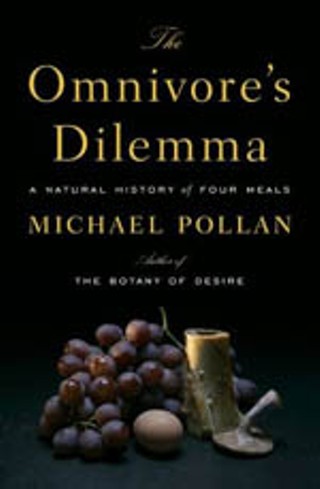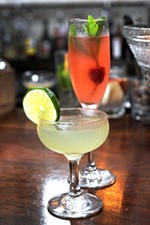The Omnivore's Dilemma
The decisions we make regarding what foods we buy, where we buy them, and how we eat them have implications that touch on environmental, political, economic, moral, health, and agricultural issues
By Claudia Alarcón, Fri., June 9, 2006

The Omnivore's Dilemma: A Natural History of Four Meals
by Michael Pollan
Penguin Press, 450 pp., $26.95
Being omnivorous, as we are, presents its challenges. And even what appears to be the simplest of tasks, such as deciding what to eat, can become a complicated affair involving a vast network of possibilities. The decisions we make regarding what foods we buy, where we buy them, and how we eat them have implications that touch on environmental, political, economic, moral, health, and agricultural issues. Michael Pollan, a brilliant professor of journalism at Berkeley and author of the award-winning The Botany of Desire, calls this decision "voting with your fork." The Omnivore's Dilemma, the result of three years of amazingly thorough research, chronicles his astonishing findings after he decided to trace the ingredients of four meals back to their origins. Pollan writes in the same laid-back, witty way that he speaks. However horrifying its revelations, the book is a gripping delight, exploring industrial food and the "cornifycation" of America. Massive agricultural subsidies for corn produce an unsustainable monoculture food chain that in turn feeds us processed empty calories. Corn is present in pretty much every prepared food item we consume: For example, corn constitutes a third of the ingredients of a chicken nugget. The paradox is that while the USDA subsidizes the production of corn to produce high fructose corn syrup, it also seeks to promote good nutrition to fight against diabetes and obesity. The book addresses sustainable farming, organic and locally produced foods, and what Pollan calls "industrial organics." Just because you buy a product at Whole Foods, it doesn't mean it's better for you or for the planet. That organic chicken was likely raised in an organic feedlot, and an amazing amount of fossil fuel energy was wasted in bringing it to your local health food store. The last chapter describes a fascinating meal for which Pollan hunted, gathered, or grew almost every ingredient. He describes this meal as a life-changing experience and one of the best of his life. This is a brilliant, revolutionary book with huge implications for our future, and a must-read for everyone. And I do mean everyone.








